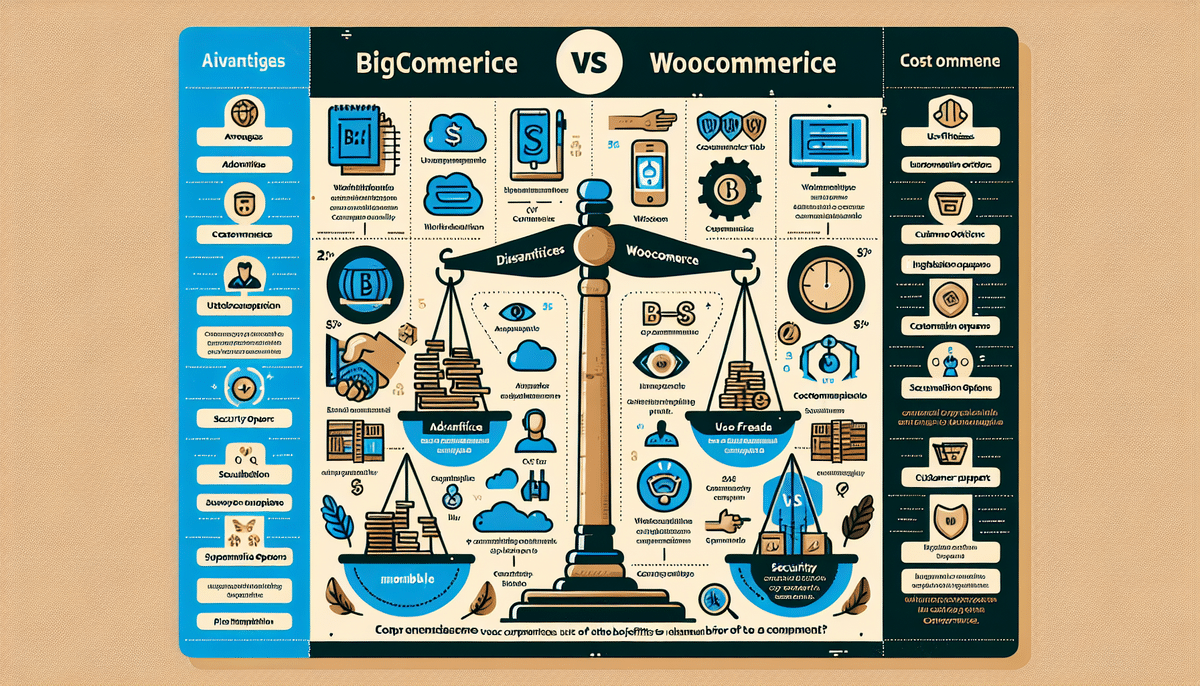Amazon vs BigCommerce: A Comprehensive Comparison for Your Online Store
Choosing the right e-commerce platform is crucial for the success of your online business. Amazon and BigCommerce are two of the most popular options available, each offering unique features and benefits. This article provides an in-depth comparison of Amazon and BigCommerce across various parameters to help you make an informed decision.
Overview of Amazon and BigCommerce
Amazon is one of the world's largest online marketplaces, attracting millions of shoppers daily. It offers sellers a vast platform to list and sell products, benefiting from Amazon’s extensive customer base and robust infrastructure.
BigCommerce, on the other hand, is a software-as-a-service (SaaS) platform designed for businesses to create, manage, and scale their own online stores. It provides extensive customization options, integrations, and control over branding and customer experience.
While Amazon serves as a massive marketplace with a ready-made audience, BigCommerce allows businesses to build their own unique online presence with greater flexibility and control.
Pros and Cons
Amazon
- Pros:
- Access to a vast customer base with over 300 million active users worldwide (Statista)
- Robust fulfillment and shipping options through Fulfillment by Amazon (FBA)
- High trust and credibility among consumers
- Advanced advertising and promotional tools to boost product visibility
- Cons:
- High competition with millions of sellers on the platform
- Fees can be substantial, ranging from 6% to 45% per sale depending on the category (Amazon Seller Fees)
- Limited control over branding and customer relationship
- Dependency on Amazon’s policies and regulations
BigCommerce
- Pros:
- Complete control over branding, pricing, and product assortment
- Highly customizable with a wide range of templates and design options
- Extensive integrations with third-party applications and services
- No transaction fees on any plans
- Comprehensive support resources, including 24/7 customer service
- Cons:
- Requires more effort to drive traffic compared to marketplaces like Amazon
- Monthly subscription costs starting at $29.95 (BigCommerce Pricing)
- Steeper learning curve for beginners compared to out-of-the-box solutions
Features and Functionalities
Amazon
- Product listings and inventory management
- Fulfillment services (FBA)
- Comprehensive sales analytics and reporting
- Amazon Advertising for targeted marketing
- Access to Prime members
BigCommerce
- Customizable storefront themes and templates
- Multiple payment gateways including PayPal, Stripe, and Authorize.net
- Built-in SEO tools and features
- Advanced product management and categorization
- Integration with various third-party apps and services
Pricing Models
Amazon operates on a fee-based model, charging sellers per sale with fees varying based on product category and services used. For example, referral fees range from 6% to 45%, and additional fees apply for FBA services.
BigCommerce offers tiered monthly subscription plans starting at $29.95 per month, which include features like unlimited bandwidth, secure checkouts, and various integrations. Higher-tier plans provide additional features such as advanced reporting, abandoned cart recovery, and more.
Data Insight: According to Statista, Amazon’s third-party seller services generated approximately $80 billion in revenue in 2022.
Customization and Control
BigCommerce excels in providing extensive customization options. Businesses can tailor their online store’s appearance and functionality through customizable templates, APIs, and integrations with various tools. This allows for a unique brand presence and enhanced customer experience.
In contrast, Amazon offers limited customization, as sellers operate within Amazon’s predefined storefront layout. While this ensures consistency across the platform, it restricts the ability to create a distinct brand identity.
Ease of Use and Support
Amazon is relatively easy to set up, with straightforward product listing processes and access to a large community of sellers for support. However, navigating Amazon’s policies and competitive landscape can be challenging for newcomers.
BigCommerce provides a user-friendly interface with drag-and-drop functionalities and comprehensive tutorials. Additionally, BigCommerce offers 24/7 customer support through various channels, including live chat, phone, and email, ensuring assistance is readily available.
Integrations and Marketing Tools
BigCommerce offers a wide array of integrations with third-party applications, including CRM systems, email marketing tools, and social media platforms. This allows businesses to implement comprehensive marketing strategies and streamline their operations.
Amazon provides integrations primarily focused on sales and fulfillment, such as QuickBooks for accounting and advertising platforms like Google Ads and Facebook Ads for product promotion. However, the range of integrations is more limited compared to BigCommerce.
According to BigCommerce, integrating with tools like Mailchimp and HubSpot can enhance marketing efforts and improve customer engagement.
Security and SEO Capabilities
Both Amazon and BigCommerce prioritize security, implementing measures like SSL encryption and PCI compliance to protect customer data. Amazon maintains a secure payment gateway, while BigCommerce offers additional security features and compliance options to meet various business needs.
In terms of SEO, BigCommerce provides advanced SEO tools, including customizable URLs, meta tags, schema markup, and automatic sitemap generation, which can significantly improve search engine rankings. Amazon, while inherently optimized for search within its marketplace, offers limited SEO customization for sellers.
Data Insight: According to a study by Moz, effective SEO strategies can increase organic traffic by up to 14.6% for mobile and 13.3% for desktop searches.
User Reviews and Case Studies
Both platforms have garnered positive feedback from businesses globally:
- Skullcandy: Leveraged BigCommerce for its customizable storefront, enhancing brand identity and customer experience.
- Ben & Jerry's: Utilized BigCommerce to maintain a brand-driven e-commerce presence with robust customization options.
- Toyota: Employed BigCommerce to manage its comprehensive online store, benefiting from scalability and advanced features.
- Handmade Sellers on Amazon: Benefit from Amazon’s extensive reach but often face high competition and fees.
According to customer reviews on platforms like Trustpilot, BigCommerce is praised for its intuitive interface and excellent customer support, while Amazon is commended for its massive audience but critiqued for high fees and competitive challenges.
Final Verdict: Choosing the Right Platform for Your Business
The decision between Amazon and BigCommerce depends largely on your business goals and priorities:
- Choose Amazon if:
- You want immediate access to a vast customer base
- Ease of setup and fulfillment through FBA is important
- You're comfortable with higher fees in exchange for marketplace visibility
- Choose BigCommerce if:
- You seek complete control over your online store’s branding and customer experience
- You require extensive customization and integration options
- You're willing to invest time in driving traffic and building your own customer base
Ultimately, both platforms offer robust solutions for different business needs. Evaluate your long-term objectives, budget, and the level of control you desire over your online presence to determine which platform aligns best with your business strategy.
For more detailed insights, consider consulting industry reports from sources like Forrester and Gartner, which provide comprehensive analyses of e-commerce platforms and their performance.




















